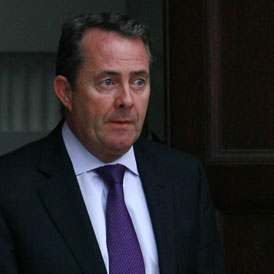Liam Fox breached ministerial code – inquiry
An official inquiry into links between Liam Fox and his self-styled adviser Adam Werritty concludes that the former defence secretary breached the ministerial code of conduct.
The investigation by Cabinet Secretary Sir Gus O’Donnell said Liam Fox was warned about his relationship with Mr Werritty by his private office and permanent secretary.
Sir Gus accused him of a “failure of judgement” and said there had been a “clear breach” of the ministerial code. He concluded that, while Dr Fox had not benefited financially, he had allowed “an inappropriate blurring of lines between official and personal relationships”. This was “not appropriate and not acceptable”.
His “close and visible association” with Mr Werritty and his misleading use of business cards describing himself as Dr Fox’s adviser gave the impression that Mr Werritty spoke on behalf of the government.
Warnings were given … and he chose to ignore them. Sir George Young, Commons Leader
The Leader of the House of Commons, Sir George Young, told Channel 4 News: “I think it’s quite clear from the report what went wrong, in that warnings were given to Dr Fox by his department and he chose to ignore them and then nothing happened.
“And one of the key recommendations by the cabinet secretary is that, should that occur again, it should be escalated, firstly to the cabinet secretary and then ultimately to the prime minister, so unacceptable behaviour or breaches of the ministerial code would not simply go on, as appears to have happened in this particular case.”

Six donors
The report named six private donors to Mr Werritty’s company Pargav and said his links to Dr Fox meant the donations “could at least be seen as giving rise to the perception of a conflict of interest”.
Sir Gus has issued a series of recommendations to strengthen systems and make clear which advisers hold official positions. Downing Street said Prime Minister David Cameron accepted all of these.
Fox statement
Dr Fox said he welcomed the fact that the report had rejected claims that national security had been breached or he had gained financially. In a statement, he said it had been a “mistake” to blur distinctions between government and private roles, adding: “I take my share of the responsibility for this.”
He concluded: “More care should have been taken to avoid the impression that anyone other than minsters and officials were speaking on behalf of the government, as this was not the case. Although there were no actual conflicts of interest, I acknowledge that in order to avoid any possible perception of this, all private interests should have been fully declared to the permanent secretary.”
National security
Asked to respond to the report’s conclusion that by allowing Mr Werritty to know his overseas travel plans, Dr Fox had put himself and his entourage at risk, Sir George told Channel 4 News: “The overall conclusion of the cabinet secretary was that there was no risk to national security, no evidence of financial gain, no evidence of misuse of public funds.
“But there is a recommendation that in future the ministerial diary should not be disclosed in the way that it was, because it might give details, not just of the secretary of state’s movements, but of other people.”
Read more: Liam Fox, Sri Lanka, and a friend called Werritty
Resignation
The former defence secretary resigned on 14 October after it was revealed that Mr Werritty’s trips abroad were bankrolled by a not-for-profit company funded by supporters of Dr Fox, some with links to the defence industry.
Sir Gus was ordered by the prime minister to take over an internal Ministry of Defence (MoD) inquiry in an effort to provide answers to “all remaining questions”. His remit was limited to establishing the facts about Mr Werritty’s activities.
I take my share of the responsibility for this. Liam Fox, former defence secretary
Labour, which wanted the investigation widened, called on the prime minister to make a statement to the Commons on what he knew about the matter, but Speaker John Bercow rejected the request.
An interim MoD report has already established that Dr Fox met Mr Werritty, who used business cards describing himself as Dr Fox’s adviser even though he had no official role, 40 times since coming to office.
Trips abroad
Their contacts included trips abroad and meetings at the Ministry of Defence (MoD), including talks with the Israeli ambassador, dinner with the new US commander of international forces in Afghanistan, and a meeting in Dubai with a defence supplier without MoD officials present.
One financial backer, venture capitalist Jon Moulton, later disclosed that Dr Fox had approached him personally for a donation saying the company, Pargav, was involved in “security policy analysis and research”.
Meetings
The prime minister’s official spokesman said Mr Cameron had “no recollection” of ever meeting Mr Werritty. But the MoD has found that junior ministers Lord Astor and Gerald Howarth talked to him.
The Electoral Commission has written to Dr Fox saying it does not plan to take up a complaint that he broke the law on political donations. The Parliamentary Standards Commissioner has been asked to look into claims Dr Fox let Mr Werritty live rent-free in, and run a business from, a taxpayer-funded property.
The Labour MP John Mann has asked the police to investigate whether Mr Werritty committed fraud by representing himself as Dr Fox’s adviser.